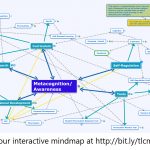Our overarching project goal was to increase metacognition through play and inquiry-based learning. Within our project, we explored the following subset goals:
- Develop and explore the play-inquiry continuum
- Explore self-regulation and self-awareness to develop an understanding of how well-being impacts student achievement and engagement
- Track metacognitive awareness of implementation of voice, choice and flexibilities through play/inquiry
- Collect data based on rapid protoyping of self-regulatory tools, strategies and materials implemented in primary, junior and intermediate classrooms
- Explore and develop innovative and effective models of professional and personal development that are flexible and responsive in order to ensure our work is replicable and sustainable
To see more of our learning journey, access our mind map at bit.ly/metaed (alternative link: http://testonvillage.ca/tlcmeta).
Team Members
Melissa Armstrong
York Region District School Board
Rob Chodos
York Region District School Board
Professional Learning Goals
With this work, we built our capacity as educators to better understand:
- The components of inquiry-based learning and play-based learning, how to plan using student sparks, and specifically student awareness during inquiry (look-fors)
- The role of metacognition in the learning process through reflection, assessment and next steps
- The different domains and the role they play in self-regulation
- Sensory needs and how they impact student well-being/learning
- How stress and anxiety (relation to brain/students’ ability to self-regulate) impact learning
By better understanding the role of metacognition through the lens of play and inquiry in the classroom, our aim was to further develop our own awareness of our biases when planning for the individual growth of our students.
To see more of our learning journey, access our mind map at bit.ly/metaed (alternative link: http://testonvillage.ca/tlcmeta).
Activities and Resources
Through co-planning and co-reflection, research, attending conferences and connecting with professionals in the areas of mental health and well-being, we worked towards focusing on the following goals in our practices:
- Ensure we have co-constructed criteria and clear assessment tools (rubrics, checklists, data)
- Construct opportunities for reflection/assessment/next steps (metacognition) in the learning process
- Develop understanding in students regarding domains of learning, the brain (how stress impacts), sensory needs/wants
- Plan using student sparks in order to develop skills and competencies needed for play and inquiry-based learning
For more information on the resources that we used throughout this work, please see the Research Section on the mind map at bit.ly/metaed, or this direct link: bit.ly/tlcresearch.
Unexpected Challenges
Ongoing challenges were and will continue to be to recognize and shift our thinking according to our biases and to continue to find ways to elicit student thinking and their truths through appropriate curricular and social-emotional guidance.
Enhancing Student Learning and Development
The work within our project enhances student learning by shifting the focus away from grades as assessment and towards a better understanding of students’ awareness of their own learning/growth. We aimed to build student ability and understanding to:
- Use criteria and rubrics to give relevant and effective feedback
- Use self-assessment skills and ability to monitor progress and plan goals
- Develop awareness of their learning, progress and next steps
- Develop awareness of sensory needs and well-being
- Recognize individual triggers related to anxiety and stress
- Better understand and plan for how to calm and alert their minds
- Develop ability to wonder and to question through exploration
- Identify sparks by asking questions, and understand where to take that learning
To see more of our learning journey, access our mind map at bit.ly/metaed.
Sharing
We have created an interactive mind map which contains documentation of our learning broken down into subcategories. We have included student work samples, tools we’ve created, photos, and areas of research to share our learning journey. We are planning on sharing with teachers at a school-level and connecting with various departments at board-level including the well-being team. With our board focus on mental health, we see numerous connections between the work that we have been exploring and the impact on both student achievement and well-being in the broader picture. To view this mind map, please go to bit.ly/metaed. An alternate link is: http://testonvillage.ca/tlcmeta.
We have also documented some of our journey on Twitter with the hashtag #wellbeingthruplayinquiry.
Project Evaluation
Our thinking, as well as our practice, has changed throughout this learning journey and is continuing to change as we continue with our exploration. We are excited by the potential shift in practice and in education as a whole with the core of this work. The fact that we have found joy in our learning and teaching, and have developed our understanding of how to nurture joy in our students’ learning and lives helps ground our thinking around metacognition through inquiry and play. We have been able to experience a shift in our own mindsets which has helped us reimagine education by focusing on well-being and self-awareness: joy. When we began our learning journey a few years ago, we began exploring how play and inquiry could be seen as tools to both design a delivery of the curriculum, as well as get the mind calm enough to respond to its delivery. By engaging in this work, our views have evolved with a greater focus on metacognition/awareness as the key towards removing worry from our learning and teaching experiences.
Resources Used
Please see the “Research” section on our mind map located at bit.ly/metaed for links and notes to the resources we used in this project.
You can access the direct link to our resources used at bit.ly/tlcresearch.
https://www.mindomo.com/mindmap/7866c13f3722d9d94e359280fb804a5b
Resources Created
These resources will open in your browser in a new tab, or be downloaded to your computer.


